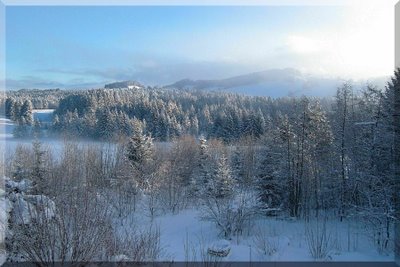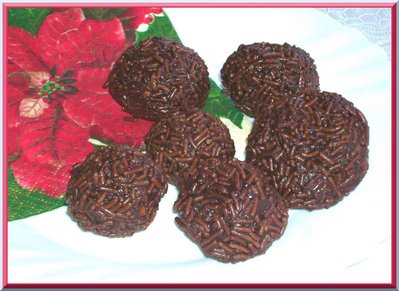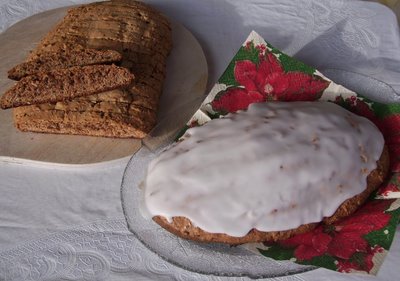Thursday, November 30, 2006
Tuesday, November 21, 2006
Traditional German Christmas with lots of cakes and cookies recipes
A guide to traditional German Christmas
Pre Christmas season ( season of advent)
In Germany, Christmas-time starts officially on the first Sunday in Advent. Regardless of that, German supermarkets start selling the first Christmas cookie, gingerbread, at the end of August. In October they start selling Christmas decorations, Christmas cookies and cakes, and with the start of November, the shops are all decorated for Christmas. Many people disapprove of this practice, but that’s business. The traditional decoration in Advent is the Advent wreath. This is a wreath made with twigs of conifers or other evergreens. It is decorated with 4 candles and Christmas decorations. On each Sunday in Advent, one of the candles is lit, on the first Sunday the first candle, on the second Sunday the second candle, and so on. The Advent wreath has been in use for just about 100 years, at first in the middle-class families and since the 1950s it became a custom in the whole of Germany. On December 1, the children open the first little window of the Advent Calendar. Traditionally, there are pictures with Christmas symbols behind the windows, for the past decades though, there are also calendars sold with little pieces of chocolate or other gifts instead of pictures. On each day, from December 1 to December 24, the children are allowed to open one window and they usually are very excited about it. Many Germans wish for a white Christmas, but apart from the mountain areas, the chance to have a white Christmas in Germany is only 25%. Christmas without snow is called green Christmas.

A nice tradition is to visit Christmas fairs. In the big cities and almost every little town, all kinds of Christmas fairs take place. Some are commercial like fun-fairs with more market stalls selling fast food or beverages than stalls selling Christmas goods. The loveliest Christmas fairs are the ones selling arts and crafts, often made by hobby artists. Here, you can find a lot of ideas for gifts which are self made and made with affection. The most popular beverage sold on Christmas fairs is mulled wine (Glühwein), and for children there is a non-alcoholic variant called children‘s punch. These hot beverages help to warm up in cold weather.
Christmas Eve
In Germany, December 25 and 26 are holidays but December 24 is not. On Heiligabend supermarkets and shops are open as on normal Saturdays, which means that they close sometime in the afternoon. Many people take half a day off. In Germany, the evening of December 24 is called Heiligabend, Christmas Eve. Family members decorate the Christmas tree while Mother prepares dinner. The dinner on Christmas Eve is regionally different, it can be carp, potato salad with sausages, or a dish of lentils. Religious families go to church, either in the early evening to celebrate Christ Vesper, or they go to Midnight Mass. (Christmette) Each family has its own tradition but in most families, Bescherung – the exchanging of gifts – takes place after Christ Vesper. Some families also exchange gifts on the morning of December 25. Besides, every family member gets a so called Christmas plate (Weihnachtsteller or Bunter Teller) which is a plate of cakes and sweets. Normally, children eat so many sweets from their plate, that they are too full up for Christmas Dinner the next day.
Christmas Day and Boxing Day
In Germany, the Christmas holidays are called First and Second Christmas Day. On Christmas Eve, German families usually stay together to celebrate Christmas by themselves, but on the First and Second Christmas Day, they go out to visit relatives. The traditional Christmas dinner is roast goose with potato dumplings and red cabbage (or curly kale). In the afternoon, Christmas fruit loaf (Stollen) and other Christmas cakes and cookies are served.
German vokabulary:
o Weihnachtsmarkt ................Christmas fair
o Glühwein .........................Mulled wine
o Heiligabend ......................Christmas Eve
o Bescherung .......................Exchanging of gifts
o Christmette ......................Midnight Mass
o Bunter Teller ....................Christmas plate
o Stollen ............................fruit loaf, stollen
My favourite German Christmas cakes and cookies recipes. Please come back again, still under construction
Pre Christmas season ( season of advent)
In Germany, Christmas-time starts officially on the first Sunday in Advent. Regardless of that, German supermarkets start selling the first Christmas cookie, gingerbread, at the end of August. In October they start selling Christmas decorations, Christmas cookies and cakes, and with the start of November, the shops are all decorated for Christmas. Many people disapprove of this practice, but that’s business. The traditional decoration in Advent is the Advent wreath. This is a wreath made with twigs of conifers or other evergreens. It is decorated with 4 candles and Christmas decorations. On each Sunday in Advent, one of the candles is lit, on the first Sunday the first candle, on the second Sunday the second candle, and so on. The Advent wreath has been in use for just about 100 years, at first in the middle-class families and since the 1950s it became a custom in the whole of Germany. On December 1, the children open the first little window of the Advent Calendar. Traditionally, there are pictures with Christmas symbols behind the windows, for the past decades though, there are also calendars sold with little pieces of chocolate or other gifts instead of pictures. On each day, from December 1 to December 24, the children are allowed to open one window and they usually are very excited about it. Many Germans wish for a white Christmas, but apart from the mountain areas, the chance to have a white Christmas in Germany is only 25%. Christmas without snow is called green Christmas.

A nice tradition is to visit Christmas fairs. In the big cities and almost every little town, all kinds of Christmas fairs take place. Some are commercial like fun-fairs with more market stalls selling fast food or beverages than stalls selling Christmas goods. The loveliest Christmas fairs are the ones selling arts and crafts, often made by hobby artists. Here, you can find a lot of ideas for gifts which are self made and made with affection. The most popular beverage sold on Christmas fairs is mulled wine (Glühwein), and for children there is a non-alcoholic variant called children‘s punch. These hot beverages help to warm up in cold weather.
Christmas Eve
In Germany, December 25 and 26 are holidays but December 24 is not. On Heiligabend supermarkets and shops are open as on normal Saturdays, which means that they close sometime in the afternoon. Many people take half a day off. In Germany, the evening of December 24 is called Heiligabend, Christmas Eve. Family members decorate the Christmas tree while Mother prepares dinner. The dinner on Christmas Eve is regionally different, it can be carp, potato salad with sausages, or a dish of lentils. Religious families go to church, either in the early evening to celebrate Christ Vesper, or they go to Midnight Mass. (Christmette) Each family has its own tradition but in most families, Bescherung – the exchanging of gifts – takes place after Christ Vesper. Some families also exchange gifts on the morning of December 25. Besides, every family member gets a so called Christmas plate (Weihnachtsteller or Bunter Teller) which is a plate of cakes and sweets. Normally, children eat so many sweets from their plate, that they are too full up for Christmas Dinner the next day.
Christmas Day and Boxing Day
In Germany, the Christmas holidays are called First and Second Christmas Day. On Christmas Eve, German families usually stay together to celebrate Christmas by themselves, but on the First and Second Christmas Day, they go out to visit relatives. The traditional Christmas dinner is roast goose with potato dumplings and red cabbage (or curly kale). In the afternoon, Christmas fruit loaf (Stollen) and other Christmas cakes and cookies are served.
German vokabulary:
o Weihnachtsmarkt ................Christmas fair
o Glühwein .........................Mulled wine
o Heiligabend ......................Christmas Eve
o Bescherung .......................Exchanging of gifts
o Christmette ......................Midnight Mass
o Bunter Teller ....................Christmas plate
o Stollen ............................fruit loaf, stollen
My favourite German Christmas cakes and cookies recipes. Please come back again, still under construction
Rumkugeln

Rum Balls (Rumkugeln)
- 200 grams of plain chocolate
- 25 grams of butter
- 1 tablespoon of cocoa powder
- 12 tablespoons of icing sugar
- 1 tablespoon of condensed milk or coffee cream
- 350 grams of grated almonds
- 10 tablespoons of rum (40%)
- chocolate granules
Melt plain chocolate slowly in the top of a double boiler, over hot water Stir other ingredients into melted chocolate When the mixture has cooled down, form balls Roll the balls in chocolate granules until they are fully covered Put the ready balls into the fridge and let them become hard (about one night)
Mulled wine
Mulled wine (Glühwein)
There are a lot of recipes for Mulled wine. Here is one of them.
Pour the red wine in a pot and add freshly squeezed lemon juice. Add some slices of an untreated lemon and orange, cinnamon sticks and cloves Add sugar to taste.
The amount of ingredients depends on the amount of wine. Heat the wine just below boiling point, don't let it boil. Serve in a heat proof glass or a mug.
There are a lot of recipes for Mulled wine. Here is one of them.
- red wine
- lemon juice
- untreated lemon slices
- untreated orange slices
- cinnamon sticks
- cloves
- sugar
Pour the red wine in a pot and add freshly squeezed lemon juice. Add some slices of an untreated lemon and orange, cinnamon sticks and cloves Add sugar to taste.
The amount of ingredients depends on the amount of wine. Heat the wine just below boiling point, don't let it boil. Serve in a heat proof glass or a mug.
Please visit my German blog about christmas:
http://www.weihnachtszeit.blogspot.com
